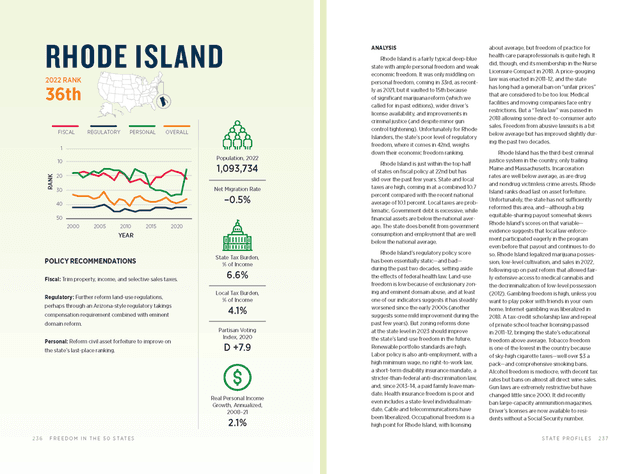Policy Recommendations
- Fiscal Trim property, income, and selective sales taxes.
- Regulatory Further reform land-use regulations, perhaps through an Arizona-style regulatory takings compensation requirement combined with eminent domain reform.
- Personal Reform civil asset forfeiture to improve on the state’s last-place ranking.
Analysis
Rhode Island is a fairly typical deep-blue state with ample personal freedom and weak economic freedom. It was only middling on personal freedom, coming in 33rd, as recently as 2021, but it vaulted to 15th because of significant marijuana reform (which we called for in past editions), wider driver’s license availability, and improvements in criminal justice (and despite minor gun control tightening). Unfortunately for Rhode Islanders, the state’s poor level of regulatory freedom, where it comes in 42nd, weighs down their economic freedom ranking.
Rhode Island is just within the top half of states on fiscal policy at 22nd but has slid over the past few years. State and local taxes are high, coming in at a combined 10.7 percent compared with the recent national average of 10.1 percent. Local taxes are problematic. Government debt is excessive, while financial assets are below the national average. The state does benefit from government consumption and employment that are well below the national average.
Rhode Island’s regulatory policy score has been essentially static—and bad—during the past two decades, setting aside the effects of federal health law. Land-use freedom is low because of exclusionary zoning and eminent domain abuse, and at least one of our indicators suggests it has steadily worsened since the early 2000s (another suggests some mild improvement during the past few years). But zoning reforms done at the state level in 2023 should improve the state’s land-use freedom in the future. Renewable portfolio standards are high. Labor policy is also anti-employment, with a high minimum wage, no right-to-work law, a short-term disability insurance mandate, a stricter-than-federal anti-discrimination law, and, since 2013–14, a paid family leave mandate. Health insurance freedom is poor and even includes a state-level individual mandate. Cable and telecommunications have been liberalized. Occupational freedom is a high point for Rhode Island, with licensing about average, but freedom of practice for health care paraprofessionals is quite high. It did, though, end its membership in the Nurse Licensure Compact in 2018. A price-gouging law was enacted in 2011–12, and the state has long had a general ban on “unfair prices” that are considered to be too low. Medical facilities and moving companies face entry restrictions. But a “Tesla law” was passed in 2018 allowing some direct-to-consumer auto sales. Freedom from abusive lawsuits is a bit below average but has improved slightly during the past two decades.
Rhode Island has the third-best criminal justice system in the country, only trailing Maine and Massachusetts. Incarceration rates are well below average, as are drug and nondrug victimless crime arrests. Rhode Island ranks dead last on asset forfeiture. Unfortunately, the state has not sufficiently reformed this area, and—although a big equitable-sharing payout somewhat skews Rhode Island’s scores on that variable—evidence suggests that local law enforcement participated eagerly in the program even before that payout and continues to do so. Rhode Island legalized marijuana possession, low-level cultivation, and sales in 2022, following up on past reform that allowed fairly extensive access to medical cannabis and the decriminalization of low-level possession (2012). Gambling freedom is high, unless you want to play poker with friends in your own home. Internet gambling was liberalized in 2018. A tax-credit scholarship law and repeal of private school teacher licensing passed in 2011–12, bringing the state’s educational freedom above average. Tobacco freedom is one of the lowest in the country because of sky-high cigarette taxes—well over $3 a pack—and comprehensive smoking bans. Alcohol freedom is mediocre, with decent tax rates but bans on almost all direct wine sales. Gun laws are extremely restrictive but have changed little since 2000. It did recently ban large-capacity ammunition magazines. Driver’s licenses are now available to residents without a Social Security number.

